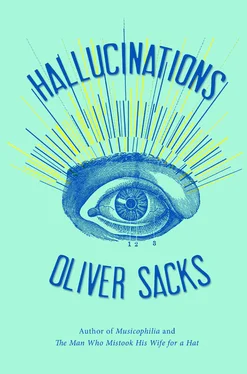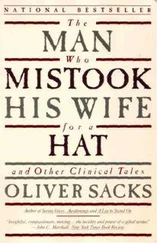In CBS, if there is some remaining vision, there may also be perceptual distortions of all sorts. Similarly, those who have lost much but not all of their sense of smell tend to suffer from distortions of smell, often of an unpleasant sort (a condition called parosmia or dysosmia).
Mary B., a Canadian woman, acquired dysosmia two months after an operation performed under general anesthesia. Eight years later, she sent me a detailed account of her experiences, entitled “A Phantom in My Brain.” She wrote:
It happened fast. In September 1999 I felt great. I’d had a hysterectomy in the summer, but I was already back to daily Pilates and ballet classes, feeling fit and full of vigour. Four months later I was still fit and vigorous, but I was locked in an invisible prison by a disorder no one could see, that no one seemed to know anything about, that I couldn’t even find a name for.
The changes were gradual at first. In September tomatoes and oranges started tasting metallic and a bit rotten, and cottage cheese tasted like sour milk. I tried different brands; they were all bad.
During October, lettuce began to smell and taste of turpentine, and spinach, apples, carrots and cauliflower tasted slightly rotten. Fish and meat, especially chicken, smelt as if they’d been rotting for a week. My partner couldn’t detect the off tastes at all. Was I developing some sort of food allergy?…
Soon the exhaust fans of restaurant kitchens started smelling weirdly unpleasant. Bread tasted rancid; chocolate, like machine oil. The only meat or fish I could eat was smoked salmon. I started having it three times a week. In early December we ate out with friends. I had to choose carefully, but I enjoyed the meal, except that the mineral water smelt like bleach. But the others were drinking it happily, and I decided that my glass hadn’t been rinsed properly. Smells and tastes got dramatically worse in the next week. Traffic smelt so bad that I had to force myself to go out; I made long detours to go to my Pilates and ballet classes by pedestrian-only routes. Wine smelt revolting; so did anybody who was wearing scent. The smell of Ian’s morning coffee had been getting worse, but between one day and the next it turned into a lurid, intolerable stench that permeated the house and lingered for hours. He started having coffee at work.
Ms. B. kept careful notes, hoping to find, if not an explanation, at least some pattern to the distortions, but she could find none. “There was no rhyme or reason to it,” she wrote. “How could lemons taste okay but not oranges; garlic, but not onions?”
With complete anosmia, rather than exaggerations or distortions of perceived smells, there can only be hallucinations of smell. These too can be very various, and sometimes difficult to define or describe. This was brought out by Heather A.:
The hallucinations generally cannot be described by one smell descriptor (except one night I smelled dill pickles for most of an evening). I can kind of describe them as an amalgam of other smells (metallic-y roll-on deodorant; dense acrid-sweet cake; melted plastic in a three-day-old garbage pile). I have been able to have fun with it in this way, make an art of naming/describing them. In the beginning, I would go through phases where I would access one at a time for a couple of weeks, multiple times a day. After a few months, the family of smells I had gone through had diversified, and now I can reference several different ones in a day. Sometimes a new one will pop up and I may not smell it again. The experience of them varies. Sometimes they will come up strong, like something stuck right under my nose, and dissipate quickly; sometimes one will be subtle and linger, at times barely noticeable.
Some people hallucinate a particular smell, which may be influenced by context or suggestion. Laura H., who lost most of her sense of smell after a craniotomy, wrote to me that she would occasionally have a brief burst of smells that were plausible, though not always entirely accurate from what she remembered sensing before her loss. Sometimes they were not really there at all:
Our kitchen was being revamped, and the electrics blew one evening. My husband assured me that all was safe but I was very worried about a possible electrical fire that might start.… I woke up in the middle of the night and had to get up to check the kitchen because I thought I could smell electrical burning.… I checked everywhere I could see in the kitchen, hall, cupboards, but could see nothing burning.… I then started to think the smell could be coming from behind a wall or somewhere I couldn’t see.
She woke her husband; he could smell nothing, but she could still smell the smoke strongly. “I was shocked,” she said, “by how strongly I could smell something that wasn’t there.”
Others may be haunted by a single constant smell of such complexity that it seems to conglomerate almost all the bad smells in the world. Bonnie Blodgett, in her book Remembering Smell , describes the phantosmic world she was plunged into following a sinus infection and the use of a potent nasal spray. She was driving along a state highway when she first detected a “weird” smell. She checked her shoes at a gas station, found them clean, then wondered if there was something amiss with the heater fan in the car — a dead bird perhaps? The smell pursued her, waxing and waning in intensity but never absent. She explored a dozen possible external causes and was finally, reluctantly, forced to the realization that the smell was in her head — in a neurological, not a psychiatric, sense. She described the smell as resembling “shit, puke, burning flesh and rotten eggs. Not to mention smoke, chemicals, urine and mold. My brain had truly outdone itself.” (Hallucination of particularly vile smells is called cacosmia.)
While humans can detect and identify perhaps ten thousand distinct smells, the number of possible smells is far greater, for there are more than five hundred different odorant receptor sites in the nasal mucosa, and stimulation of these (or their cerebral representations) may be combined in trillions of ways. Some hallucinated smells may be impossible to describe because they are different from anything ever experienced in the real world, and evoke no memories or associations. New, unprecedented experiences can be a hallmark of hallucinations, for when the brain is released from the constraints of reality, it can generate any sound, image, or smell in its repertoire, sometimes in complex and “impossible” combinations.
In 1973 the journal Science published an article that caused an immediate furor. It was entitled “On Being Sane in Insane Places,” and it described how, as an experiment, eight “pseudopatients” with no history of mental illness presented themselves at a variety of hospitals across the United States. Their single complaint was that they “heard voices.” They told hospital staff that they could not really make out what the voices said but that they heard the words “empty,” “hollow,” and “thud.” Apart from this fabrication, they behaved normally and recounted their own (normal) past experiences and medical histories. Nonetheless, all of them were diagnosed as schizophrenic (except one, who was diagnosed with “manic-depressive psychosis”), hospitalized for up to two months, and prescribed antipsychotic medications (which they did not swallow). Once admitted to the mental wards, they continued to speak and behave normally; they reported to the medical staff that their hallucinated voices had disappeared and that they felt fine. They even kept notes on their experiment, quite openly (this was registered in the nursing notes for one pseudopatient as “writing behavior”), but none of the pseudopatients were identified as such by the staff. 17 17 The real patients, however, were more observant. “You’re not crazy,” said one. “You’re a journalist or a professor.”
This experiment, designed by David Rosenhan, a Stanford psychologist (and himself a pseudopatient), emphasized, among other things, that the single symptom of “hearing voices” could suffice for an immediate, categorical diagnosis of schizophrenia even in the absence of any other symptoms or abnormalities of behavior. Psychiatry, and society in general, had been subverted by the almost axiomatic belief that “hearing voices” spelled madness and never occurred except in the context of severe mental disturbance.
Читать дальше












